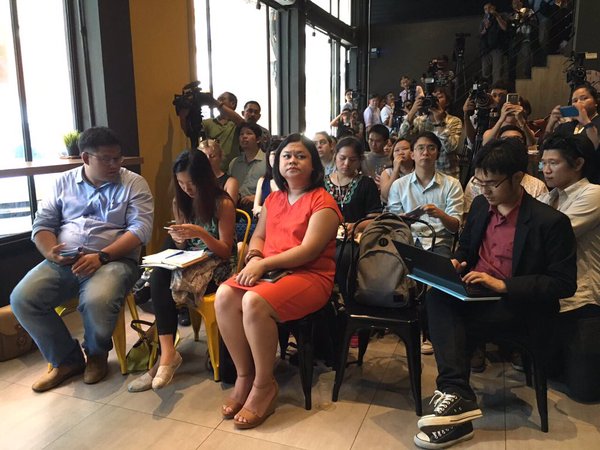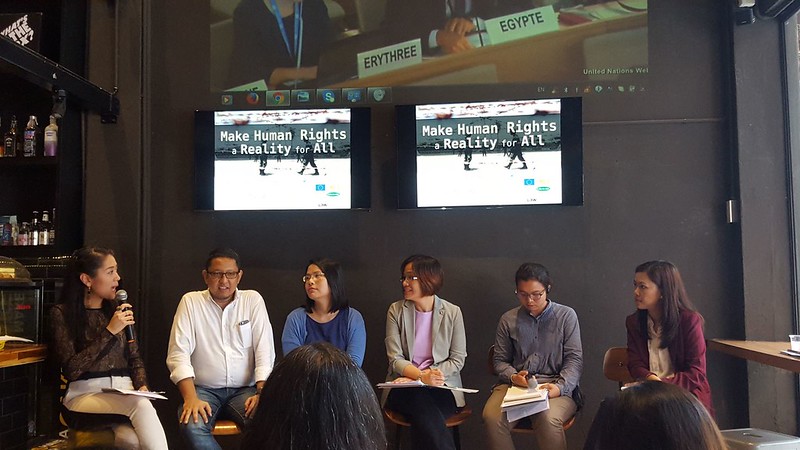Giggles were heard Wednesday, 11 May 2016, at a panel discussion and viewing of Phase Two of Thailand’s Universal Periodic Review by the United Nations at Black Box Café and Bar Ploenchit, during the opening remarks by a Thai Government representative. The tone of the day had been set.
The Universal Periodic Review (UPR) is a mechanism of the United Nations to assure transparent practice of human rights, which operates in a five year cycle. It further allows countries under review to promote their efforts of human rights practices.
Multiple representatives discussed how the country has made improvements since the first phase of the UPR, starting in October 2011, by following many of the 134 recommendations that were received at that time
During the buzzword filled introductory remarks by a Thai government representative, which came as a review of progress and a defense to the many criticisms of Thai human rights practices, lines such as “Thailand is committed to the promotion and protection of Human Rights of the people” and “Thailand’s present interim constitution guarantees all human dignity, rights, liberties and equalities of the people” drew disbelief and snickers among attendees.
The hollow remarks were not only felt within the room. Human Rights Watch has since stated that “The Thai government’s pledges to the United Nations Human Rights Council to respect human rights and restore democratic rule have been mostly meaningless.”
Many countries shared concern for the current state of Thai human rights for various reasons including human trafficking, the death penalty, suppressed freedom of expression, and gender inequality.
Pannikar Wanich, a Voice TV news anchor, started off the panel discussion by joking about the unnecessary sending of 36 Thai Government representatives to Switzerland, she quipped that it made sense because Switzerland is a beautiful country.
This unsupportive sentiment was reflected in the analysis panel at the event as well. June Charoensiri, a panelist and human rights lawyer, explained how Thailand does sign international conventions, and often ratifies them, but internal laws are never implemented for the enforcement of these conventions.
Much more than this was said during the discussion of the panelists, and in varying orders, but these are some highlights followed by shared concerns and recommendations from other countries.
Nattaporn Artharn, from the Legal Center for Human Rights, expressed concern for environmental activists who disappear while trying to protect natural resources, and how rural vulnerable populations have no form of protection from unconsented changes of their land for the use of natural resource production.
The panelists.
A majority of countries recommended the full implementation of Enforced Disappearances Convention to assure these practices stop, and that the families will earn the right to seek justice.
Sunai Phasuk, from Human Rights Watch, was clearly frustrated with the state of Thai human right. He discussed how in a Thai State report, those who are fighting for human rights are protected by the government, yet more than 30 people have now been killed fighting for these rights.
Botswana and Romania both urged the Thai government to bring the perpetrators of these human rights defender’s deaths to justice.
Angkhana Neelapaijit, a National Human Rights Commission of Thailand (NHRC) commissioner, showed distaste for the government’s treatment of human rights citing the lack of respect for the NHRC, which inhibits the institutions ability to properly perform its work.
To concerns like this, the Czech Republic urged the Thai government to stop the harassment and intimidation of human rights defenders and implement measures to prevent violence and crimes against them.
Nada Chaiyajit, a Sexual Orientation and Gender Identification Activist, was frustrated about the lack of gender equality measures since the dismissal of the 2007 Constitution, as well as frustration with the Penitentiary Act, which forces pre-operation trans-prisoners to be jailed with people of the the same sex determination, rather than with their gender identification. This often results in increased danger for imprisoned trans-people.
Spain recommended the Thai government to implement the Gender Equality Act without restrictions for religious or national security purposes.
Lastly, Parinya Boonridrerthaikul, alongside representatives of migrant workers groups, explained the struggles and lacks of rights of refugee populations in Thailand, as well as the Thai government’s efforts and lack of workers rights that cause the undermining of unions, especially for migrant workers, to exist citing that there are about 300,000 companies in Thailand, and only 1100 unions.
Bolivia made a recommendation that reflected these points in that there should be protection of the rights of farmers and people in rural areas as well.


